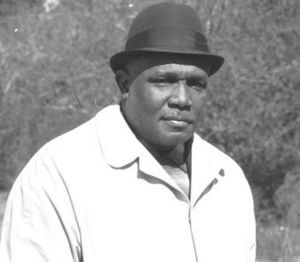Amzie Moore facts for kids
Quick facts for kids
Amzie Moore
|
|
|---|---|

Amzie Moore photographed in 1963 by Harvey Richards.
|
|
| Born | September 23, 1911 |
| Died | February 1, 1982 (aged 70) |
Amzie Moore (born September 23, 1911 – died February 1, 1982) was an important African-American leader. He worked for civil rights and was also a businessman. He lived in the Mississippi Delta region of the United States. He helped many African Americans in Mississippi gain their right to vote.
Contents
Amzie Moore's Early Life
Amzie Moore was born on September 23, 1911. His birthplace was Wilkin Plantation in Grenada County, Mississippi. When he was 14, his parents separated. His father left, and Amzie had to take care of himself. He went to Stone Street High School in Greenwood, Mississippi. He studied there until the tenth grade.
In 1935, he moved to Bolivar County. He got a job as a cleaner at the local Post Office. This was a good job for an African American man in the South during the Great Depression. Amzie was interested in politics from a young age. He joined the Black and Tan Party. This group was made up of African American Republicans.
He was able to register to vote in 1936. However, he could not vote in the primary elections. These elections often decided who would win the main election. In the 1940s, the Freedom Movement came to the Mississippi Delta. Amzie Moore became involved in meetings. People started to talk about what African Americans in the state wanted.
Fighting in World War II
In 1942, Amzie Moore was called to serve in World War II. He later said, "I really didn’t know what segregation was before I went into the Army." Segregation meant keeping Black and white people separate. He saw how unfair segregation was. Even in places like Calcutta, India, there were separate clubs for Black and white soldiers.
Amzie wondered why they were fighting. He felt that American soldiers should be free first. His job was to tell African American soldiers that they were important. He had to encourage them to fight against the Axis Powers. When he came home, some white groups tried to stop Black veterans. The FBI investigated these problems. This helped to end some of the aggression. Amzie Moore was very angry about the unfair treatment of his race. He became even more active in helping people register to vote in Mississippi.
Leading the Way for Change
Amzie Moore bought land and built a home. He also started a gas station and restaurant. This made him a respected leader in his community. In 1951, Dr. T.R.M. Howard started the Regional Council of Negro Leadership (RCNL). This group wanted to be the voice for African Americans in Mound Bayou and nearby areas.
The RCNL quickly became very popular. They convinced the state police to stop bothering Black drivers. They also encouraged people to register to vote. Their first big meeting had over 13,000 people. Amzie Moore said the RCNL wanted to teach Black people about being first-class citizens. This included owning property, paying taxes, and holding public office.
Moore and other RCNL leaders were also part of the NAACP. Both groups wanted freedom for African Americans. However, they sometimes had different ideas. The NAACP often used legal actions to change laws. The RCNL focused more on economic problems in the Delta. But they worked together on voter registration. Bob Moses asked Amzie Moore to lead this effort in the Delta.
Working with the NAACP
In 1955, Amzie Moore was named president of the Cleveland chapter of the NAACP. He was not at the meeting when this happened. Over the next year, he made the chapter very strong. It became the second largest NAACP chapter in Mississippi. He then became the vice president of the state NAACP conferences.
The Supreme Court decided that public schools could not be segregated. After this, some white groups caused many problems. They tried to scare the African American community. Many people who refused to take their names off the voting list faced serious threats. Amzie Moore and other leaders also received many threats.
In 1960, Moore invited the Student Nonviolent Coordinating Committee to Mississippi. He wanted them to focus on voter registration there. Their efforts helped thousands of African Americans in Mississippi get the right to vote.

